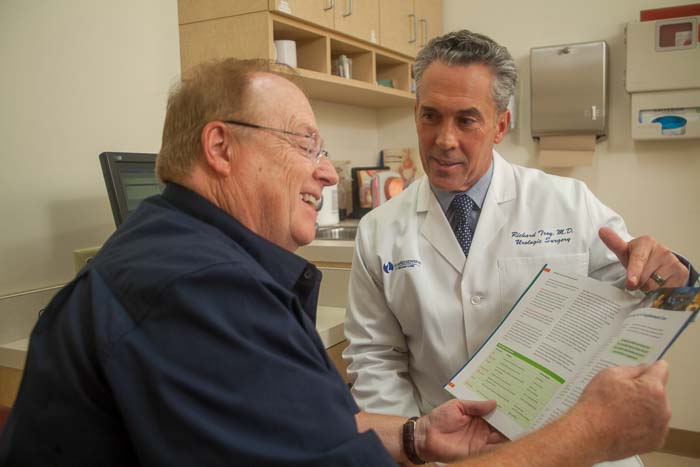Your body is a temple, but even temples need maintenance to keep from deteriorating over time. Aging takes its toll on everything, and as you approach your 40s, you may begin to feel its wear and tear on your own body. Just as a handyman can fix basic household problems, your primary care physician can keep tabs on your general physical well being, from cholesterol to blood pressure to blood sugar levels.
But there are times you’ll need a specialist to check the plumbing, so to speak. Here’s when to make the transition from your primary care physician to a urologist.
You’re over 40
Once you turn 40, you’ll want to visit a urologist for your first prostate cancer screening. Your first appointment is key to establishing a baseline for PSA levels. PSA stands for prostate-specific antigen, a protein produced by the prostate gland. High levels of PSA can indicate an increased risk of developing prostate cancer. Since prostate cancer is very rare at age 40, establishing a baseline at this age will allow your doctor to monitor your PSA levels over time, and take action if your levels spike.
You’re having trouble urinating
A variety of conditions can cause frequent, urgent, delayed, or incomplete urination, and some of them may need the attention of a urologist. Often, these symptoms are caused by bacterial infections, which may be diagnosed by a urinalysis and treated by a primary care physician. However, if the urinalysis shows no sign of infection, it’s time to see a urologist.
A urologist can perform special tests such as a cystoscopy to search for other causes of urinary difficulty, such as strictures, nerve damage, or anatomical malformations. An enlarged prostate is a common cause of urinary difficulty. Though an enlarged prostate is a natural consequence of aging, it is important for a urologist to monitor the severity of the enlargement to determine an appropriate course of treatment: medication, surgery, or continued monitoring.
You’re having difficulty maintaining an erection
If you have trouble achieving or maintaining an erection, you’re not alone. Erectile dysfunction is a common condition that can be caused by a number of factors—physical, psychological, and environmental. Often, it’s a complex combination of multiple factors. A urologist can help determine the root cause of your erectile dysfunction, and recommend appropriate treatment options, including lifestyle changes, medication, or surgery.
You’re done building your family
If you and your partner are done having children, you may want to consider a vasectomy. A vasectomy is a simple outpatient procedure that severs and seals the vas deferens, the tubes that carry sperm. It’s one of the safest and most cost-effective methods of birth control, and is over 99% effective at preventing pregnancy. If you are interested in a vasectomy, a urologist can guide you through the process and perform the procedure.
Summary
Though your primary care physician can do a lot to keep you in great health, sometimes you need a specialist to get to the root of the problem. If you have a “plumbing” issue that is compromising your quality of life—even if it is merely the stress of the unknown that is compromising your quality of life—see a urologist to help put your mind at ease.
Urologists can determine whether or not treatment is necessary, and can recommend lifestyle changes that can ease your symptoms.
Life is too short to not feel your best!

